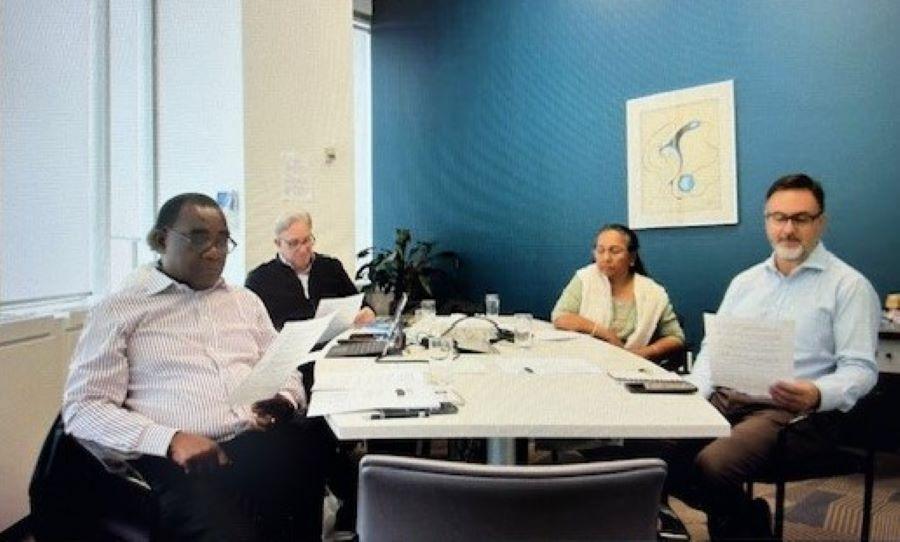
Greetings to GCE from the Partner Council
Four members of the Partner Council were able to join the General Council Executive meeting on Friday, May 10. Present were:
- Kangwa Mabuluki, General Secretary - All Africa Theological Education by Extension Association, Zambia;
- Annie Namala, Human Rights Advocacy and Research Foundation (India);
- Horacio Mesones, Director - Regional Ecumenical Centre for Advice and Service (Argentina), and
- Samer Laham, Director of Emergency Response Services - Middle East Council of Churches.
Absent was Marcelo Leites, General Secretary – World Student Christian Federation (Argentina).
What follows are their greetings, offered to the GCE as part of the morning deliberations:
Message From The United Church of Canada Partner Council to the Executive of the General Council: May 10, 2024
It is a privilege to extend our greetings today on behalf of the Partner Council. Our mission is to connect The United Church of Canada with a global perspective, sharing wisdom and drawing upon the experiences of our worldwide partners. Presently, the Partner Council comprises members from partner organizations around the globe: Rev. Kangwa Mabuluki, Mrs. Annie Namala, Mr. Samer Laham, Mr. Marcelo Leites, and Mr. Horacio Mesones.
We wish to highlight the efforts of The United Church of Canada (UCC) in strengthening global partnerships to further the Reign of God. Working in partnership, we recognize the diverse gifts and shared resources among individuals, churches, service organizations, development and human rights organizations, educational institutions, and ecumenical bodies. This work is particularly important, given the economic challenges facing not only the UCC but the broader ecumenical community.
We appreciate the ongoing endeavors to sustain partnership work and challenge narratives of decline. Furthermore, we acknowledge the commitment of The UCCanada to bear witness to peace, equality, justice, dignity, and stewardship of our Common Home through partnership efforts in Canada and globally.
To begin, we would like to share that during these days, we have engaged in discussions on topics of shared concern between The United Church of Canada and partners from different parts of the world.
First and foremost, we addressed the impact of climate change in various contexts, particularly in terms of food insecurity, increasing poverty, migration, forced displacement, and threats to life in communities. We are concerned about governments' lack of commitment to agreements reached in multilateral meetings, particularly regarding emission levels in Canada, but we see similar situations in other contexts. We are also concerned about increasing authoritarian regimes stifling dissenting voices from affected communities.
On the other hand, we appreciate The United Church of Canada's commitment to climate justice, a theme that guides partnership work towards the future.
The Partner Council convened from May 7-9 to reflect deeper into the Roundtable proposal, building upon the work initiated in 2023 following the review of The United Church of Canada's global partnership program. During this meeting, we shared the experiences of Partner Council members, including a review of the history, principles, methodology, and learnings from Roundtable work in various contexts.
We also shared the experience of the Karibu Foundation (Norway) and its counterparts in Africa through the participatory grant-making proposal. Based on these exchanges, the Partner Council worked in developing a proposal with the following orientation:
Our focus is on shifting power in a decolonization perspective, promoting consultation processes, sharing experiences and resources, and decision-making within a framework of global participation and partnership. We recognize decolonization as a layered process addressing exclusion and discrimination within countries and communities. The concept of mutual radical accompaniment will be central to our approach. While this concept was previously included in the report, we emphasize the mutual dimension, incorporating voices from different regions, global ecumenical organizations, and Canada.
Mutual radical accompaniment entails adopting a strategic perspective that begins with a deepening of the concept, allowing us to envision coordinated actions that connect and add value to the experiences currently being developed by UCC partner organizations and others. While we adopt the Roundtable values and methodology, we believe that an appropriate name can facilitate the adoption of the process.
We reaffirm the theme of climate justice under the designation 'Mending the World,' understanding that climate justice serves as an entry point connecting with other equally significant issues such as food security, poverty, migration, gender justice, or peace promotion. It is essential to deepen the spiritual dimension and biblical foundation of the process.
In summary, our line of work can be encapsulated as follows: Shift powers through strategic design that deepens into the concept, and develops processes inspired by Roundtable methodologies, so that we can strengthen a mechanism of mutual radical accompaniment to enhance partnership from a decolonization perspective. This approach aims to promote transformations under the perspective of 'Mending the World', that includes climate justice in connection with other critical issues that affect the world today.
One crucial point to note is that, while there is historical experience and that of other churches and organizations, we understand the need to develop our own vision and work within a framework that allows us to innovate, experiment, and gather learnings to enhance the proposal over time.
As mentioned earlier, we envision the process within a framework of concentric circles starting from the experiences developed by UCCanada partners in the regions, in Canada, and global organizations, to engage and involve other stakeholders along the way. We look forward to the wider UCCanada leadership to journey with us in this process, in line with the UCCanada commitment to a whole-world approach – something to bring the larger UCCanada into the process.
Regarding the process, we identified the need to design a roadmap with specific steps to consolidate the concept and design in 2024. This includes organizing a series of informational meetings and preliminary consultations in each global partnership region, as well as holding a gathering with participants from partner organizations across different regions worldwide, including Canada, to deepen the concept and define concrete actions with a strategic outlook that will enable us to work towards mutual radical accompaniment.
We recognize that this process entails an exercise of leadership in which the Partner Council, alongside the Global Partnership Team, is committed to working in the months ahead.
